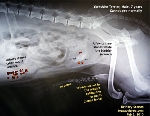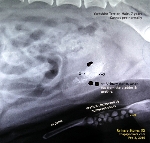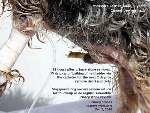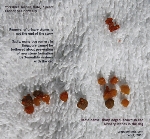"Around 8 months ago, Vet 1
checked the bladder with his hand
and said that he could feel no
urinary stones," the young man
said to me. "So he prescribed
medication. My dog stopped passing
blood in the urine for 2 months
only."
"Why didn't Vet 1 X-ray the dog?"
I asked. The young man who wanted
to be a Food and Beverage
entrepreneur said, "Vet 1 felt the
bladder and since there was no
stones, there was no need to X-ray
the bladder. He even refer me to
Vet 2 who had better X-ray and
equipment." Vet 1's X-rays did
give erratic quality and that
might be why he did not take the
X-ray. Most likely, to remain
price-competitive with Vet 2, he
would rather not increase his fees
due to X-ray charges.
This amenable young man was a good
conversationalist. He joked with
me, pointing to his tummy and
saying: "I enjoy eating food as
you can see." Yes, I could see he
looked very much like a successful
chef with the proportions and size
to prove he loves good food.
The owner then sought a second
opinion from Vet 2.
"Vet 2 did an ultrasound scan and
said there were no urinary stones.
I got the medication and the dog
stopped passing blood in the urine
for 2 months. So, I asked Vet 2 to
do an X-ray and there were urinary
stones."
"why didn't you ask Vet 2 perform
the operation?" I guessed the vet
fees would be it more expensive as
it was a much bigger set up with
vets. Price has always been
important in this period of
recession and job losses.
But the young man said: "Two of my
dogs died at Vet 2. One of them
was old. The other one died on the
operating table. So, I do not want
my dog to be operated there."
This survey showed that this dog
owner does not forgive or forget
the death of his dog on the
operating table. All vets will get
pet deaths on the operating table
as not all surgical cases are in
excellent health.
 |
 |
|
Urinary sand and stones in
the bladder and penile
urethra. Actual stones are
placed on top of the X-ray
for comparison |
Abundant fine urinary sand
is found in the bladder
during surgery. The sand can
be seen on X-ray but it is
not so clear |
 |
 |
|
Day 2 after removal of
urinary stones |
Well-formed sharp urinary
stones inside the penile
urethra |
I did this survey to help me
understand the owner's point of
view as many owners do hop between
vets. Dogs are family
members and a large number of dog
owners in Singapore and all over
the world is very worried about
deaths during anaesthesia. This
survey shows that the owner never
really forgives such episodes.
Fortunately, the old dog operated
by my Associate Dr Jason Teo was
much alive during and after the
surgery. Otherwise it would be
another black list in this young
man's book of vets to avoid.
 VETERINARY
TIP VETERINARY
TIP
In retrospect, during the surgery
in Feb 2010, this old dog had
abundant amount of urinary sand
inside the bladder. This urinary
calculi was obvious in the
excellent X-ray taken by Vet 2 but
the contrast using air inside the
bladder could not be made due to
large obstruction by stones in the
penile urethra. Bladder palpation
will not reveal the presence of
urinary sand.
More info about this case is at:
Urinary stones. Which surgical approach? |
 TOA
PAYOH VETS
TOA
PAYOH VETS TOA
PAYOH VETS
TOA
PAYOH VETS